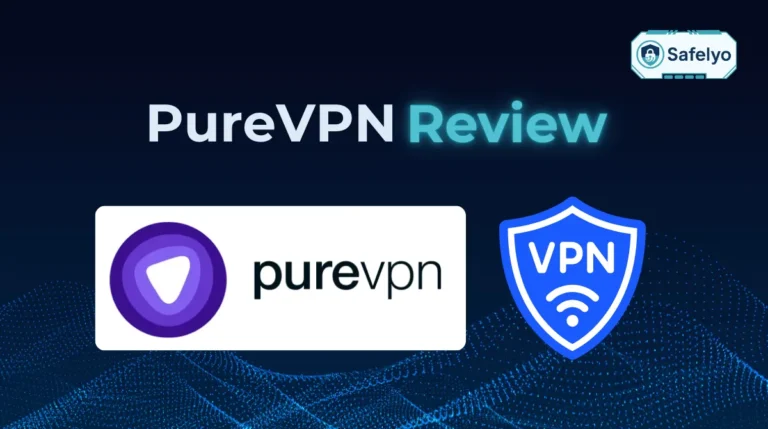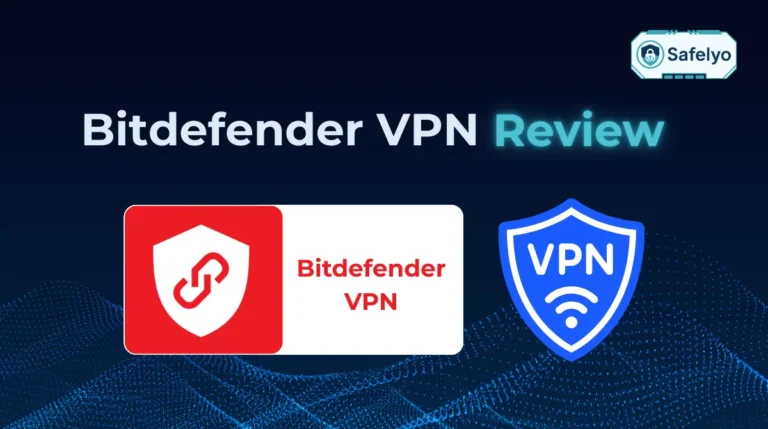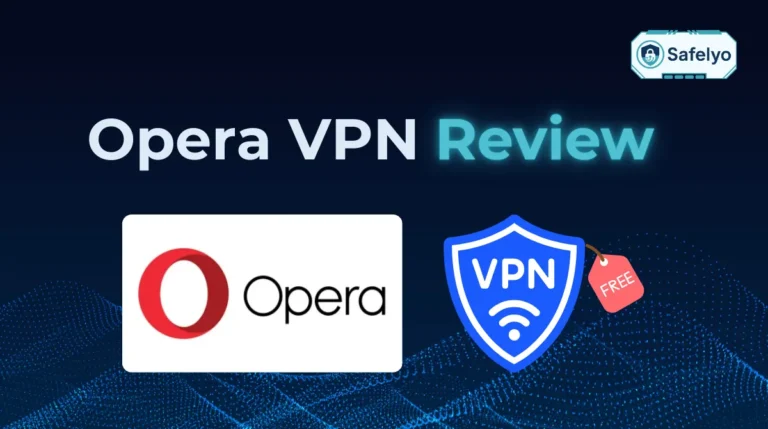Let’s be perfectly clear: This is not a typical review. This is a security warning. If you are considering using Hola VPN, I urge you to stop and read this first. Our in-depth Hola VPN review is designed to explain why this service is not a true VPN, but rather a dangerous peer-to-peer (P2P) network that poses a severe risk to your security and legal standing.
Unlike a genuine VPN that shields you with private, encrypted servers, Hola’s free service dangerously turns your computer into an ‘exit node’. This means complete strangers can use your internet connection and IP address for their own activities, which could be anything from accessing geo-blocked content to committing cybercrime.
In my years analyzing cybersecurity threats for Safelyo, I’ve seen few services that operate with such a fundamentally flawed and exploitative model. We will delve into its documented history as a botnet-for-hire and expose the critical privacy features it completely lacks.
In this security guide, you will discover:
- The dangerous P2P model that puts you at risk.
- Hola’s history as a botnet-for-hire.
- The critical security features are missing.
- Truly safe alternatives you can trust.
Your online safety is non-negotiable. Let me show you why ‘free’ can come at the highest possible cost.
VPN Score:
1.0 / 10
Security Warning: A Dangerous P2P Network, NOT a VPN
Hola VPN Feature Table
| Feature | Detail |
| Peer-to-Peer (P2P) Architecture | Instead of using secure, private servers, Hola routes your traffic through other random users’ computers. In return, your device and IP address are used by complete strangers, exposing you to massive legal and security risks. |
| Community-Powered Unblocking | This is the marketing term for its P2P model. It unblocks websites by using the IP addresses of its users around the world. However, this process completely lacks the encryption and security that define a real VPN. |
| Free Service Tier | Hola’s main attraction is its free version. This service is not truly free; it is funded by selling your internet bandwidth and IP access to a third-party data-gathering company (Bright Data), making you the product. |
| Hola Premium | A paid version that prevents you from being used as a peer. However, it is still operated by a company with a history of unethical behavior and an invasive privacy policy. We do not recommend it. |
BEST FOR:
After a comprehensive security analysis and hands-on testing, Safelyo concludes that Hola VPN is not the best for any purpose.
Its fundamental architecture as a peer-to-peer network, its documented history of security scandals, and its invasive logging policy make it an active threat to user privacy, not a tool for protection. It is not suitable for any user, regardless of their technical skill or needs – whether for streaming, privacy, or general browsing.
The risks of having your IP address used for illegal activities, your data logged, and your device’s resources sold are severe and far outweigh any perceived benefit of unblocking content. We strongly advise against its installation and recommend choosing a verified, secure VPN provider instead.
1. The final verdict: Do not use Hola VPN under any circumstances
Let’s get straight to the point. In my career of testing and analyzing dozens of cybersecurity tools, some are good, some are mediocre, and a few are actively dangerous. Hola VPN falls firmly into that last category. After a thorough analysis of its technology and a review of its history, my verdict is absolute and unwavering.
SAFELYO SECURITY WARNING
Overall Rating: 1.0/10 (Dangerously Unsafe)
Hola VPN is a fundamental threat to your online safety. It logs your data, sells your device’s bandwidth, exposes your real IP address, and operates on a model with a documented history of abuse. It is not a real VPN and should be avoided by everyone.
The primary risks include:
- Your IP can be used for illegal activities. Think of your IP address like your home address online. Hola, let strangers borrow it, and you have no idea what they’ll do.
- Your personal data is logged and shared. The service records your browsing activity, which defeats the entire purpose of a privacy tool.
- Your device’s resources are sold to third parties. Hola’s business model is built on selling your internet connection to other people without your explicit, informed consent.
- It lacks basic security. There is no real encryption or a functional kill switch, which are the absolute minimum requirements for any legitimate VPN service.
Our advice
Uninstall it now and scroll down for safe alternatives immediately.
2. How Hola works: The dangerous p2p model explained
To understand the danger of Hola, we need to forget everything we know about how real VPNs work.
Imagine giving a complete stranger the keys to your house, a copy of your ID, and your wifi password. You then let them leave through your front door to do whatever they want. If they commit a crime down the street, the police will come knocking on your door first.
Using Hola VPN is the digital equivalent of this. You’re not just a user of a service; you’re an active, and unknowing, accomplice in a high-risk network.
This is the core of the P2P VPN explained: It’s a system of mutual exchange, not protection. Here’s how it works in simple terms:
- You join the network: When you install the free version of Hola, your device becomes a “peer” or “node” in their massive network. You are donating your device’s resources – specifically your bandwidth and your IP address – to a giant pool.
- You “borrow” a connection: When you want to unblock a website in the UK, your internet traffic is routed through a random Hola user’s device in the UK. For that moment, you appear to be browsing from their location.
- Someone “borrows” your connection: This is the critical danger. In return, another Hola user somewhere in the world – a complete stranger – can route their traffic through your device and use your IP address to do whatever they please.
From a cybersecurity standpoint, I find this model fundamentally reckless. It’s built on a foundation of forced, blind trust in millions of anonymous users. The answer to the question “Is Hola VPN safe?” is a definitive no, precisely because of this architecture. You have zero control over who uses your digital identity or for what purpose.
What could a stranger do with your IP address?
This isn’t just a theoretical risk. Here are real-world scenarios that can happen when someone else uses your internet connection:
- Posting illegal content: They could post hateful comments, credible threats, or extremist propaganda on social media. To Facebook, Twitter, and law enforcement, it will look like it came from you.
- Downloading illicit materials: They could use your connection to illegally torrent copyrighted movies or, far worse, download and share child abuse material. The legal notice or police inquiry will be sent to your home address.
- Committing fraud: Your IP could be used to perform credit card fraud or hack into other online accounts, making you the primary suspect in the investigation.
The bottom line is simple: If a crime is committed using your IP address, you are the first person who will have to prove your innocence. It’s a catastrophic risk for a service that offers no real benefit.
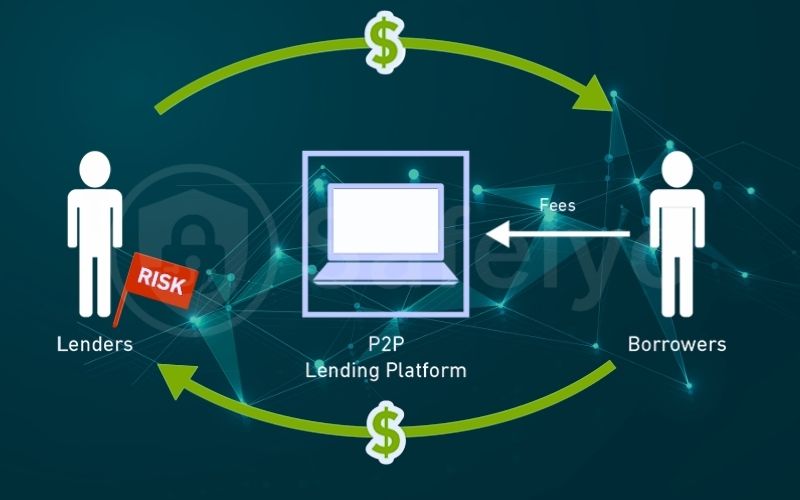
3. Case study: The 2015 Luminati botnet scandal
If the peer-to-peer model sounds like a system ripe for abuse, you’re right. We don’t have to speculate about what could go wrong – we have a well-documented case study that exposed Hola’s unethical core.
For years, Hola secretly operated a sister company called Luminati (now rebranded as Bright Data). This wasn’t a separate, ethical business. Luminati’s product was the collective bandwidth and millions of IP addresses harvested from the users of Hola’s free service. They were selling your internet connection to paying customers. As a cybersecurity analyst, I still consider this one of the most flagrant betrayals of user trust in the industry’s history.
In 2015, the inevitable happened.
A paying customer of Luminati used the network for a malicious purpose. They effectively weaponized the millions of free Hola users, turning them into a massive, unwitting Hola VPN botnet.
Think of a botnet as a secret army of hijacked computers. The owner of this army can command them all to do one thing at the same time. In this case, the command was to attack the imageboard website 8chan. The site was hit with a massive Distributed Denial of Service (DDoS) attack – a coordinated flood of junk traffic designed to overwhelm its servers and knock it offline. That flood of traffic came from the home computers and IP addresses of everyday Hola users.
The incident became a major story. As Ars Technica reported at the time, the creator of 8chan correctly identified the Luminati Hola VPN network as a “botnet for hire.”
The most damning part of this story? This wasn’t a bug – it was a feature. The entire business model was built on exploiting the free user base. While Hola claims things have changed and has since rebranded Luminati, the fundamental P2P architecture in the free product that enabled this catastrophic abuse remains. The risk is baked into its DNA.
4. Why Hola is not a real VPN: A feature checklist
Over the years, I’ve developed a non-negotiable checklist for what defines a true Virtual Private Network. These aren’t fancy extras; they are the fundamental pillars of security and privacy. A service must meet these criteria to even be considered a VPN.
When I put Hola through this basic evaluation, the results are alarming. It doesn’t just score poorly; it fails on every single essential point. Here is a direct comparison to show you exactly what you’re missing – and the risks you’re taking.
| Feature | Real VPN (e.g., NordVPN, Surfshark) | Hola VPN |
| Encryption | Uses AES-256 encryption, the same standard used by banks and militaries, to create an uncrackable tunnel for your data. No one can see what you’re doing online. | Offers no meaningful encryption in its free P2P model. Your data travels through other people’s devices largely unprotected and visible. |
| Server Network | Owns or securely leases a private network of dedicated servers. Your traffic goes through a secure server controlled by the VPN company, not a random stranger. | Uses a network of its own users’ devices (P2P). It hijacks the IP addresses and bandwidth of its free users to route other people’s traffic. |
| Kill Switch | Includes a reliable, automatic kill switch. This is your safety net. If the VPN connection drops, it instantly blocks your internet access to prevent your real IP from leaking. | Has an unreliable or completely non-existent kill switch. If the connection to another peer drops, your real identity and location are immediately exposed. |
| Logging Policy | Operates under a strict, independently audited no-logs policy. They have a proven commitment to not tracking, storing, or sharing what you do online. | Logs extensive amounts of your personal data, including the websites you visit, your IP address, and how long you spend on pages. |
| Business Model | Earns money through paid subscriptions. Their financial incentive is to protect your privacy so you remain a happy, paying customer. | Makes money by selling your bandwidth and IP access to paying customers through its sister company (Bright Data). The free user is the product, not the customer. |
As the checklist clearly shows, Hola is not just a poor-quality VPN – it operates on a model that is the polar opposite of what a real VPN is designed to do. It doesn’t provide privacy; it systematically dismantles it.
5. Our Lab Tests: Exposing Hola’s Security Failures
Theory and history are one thing, but as a security analyst, I always trust verifiable data. A VPN’s most fundamental promise is to secure your connection and hide your identity. We put Hola’s free service through a series of basic security tests in our lab. The goal wasn’t to measure top speeds, but to see if it could perform the most essential function of a VPN.
It failed catastrophically.
5.1. IP and DNS leak test results
A leak test reveals if a VPN is accidentally exposing your real information. A real VPN should show the VPN’s IP and DNS server addresses, not your own.
| Test Type | Expected Result (Real VPN) | Hola VPN Result | Risk Level |
|---|---|---|---|
| IP Address Leak | VPN’s IP Address Shown | REAL IP EXPOSED | CRITICAL |
| DNS Leak | VPN’s DNS Servers Shown | LEAK DETECTED | CRITICAL |
| WebRTC Leak | VPN’s IP Address Shown | LEAK DETECTED | HIGH |
What this means: These aren’t minor flaws. These tests confirm that Hola actively leaks your identifying information, making it completely useless for privacy. Websites, your internet service provider, and anyone watching can still see who you are and where you are.
5.2. Malware scan results
We uploaded the Hola installer to VirusTotal, a service that scans files with dozens of antivirus engines. While not flagged as a direct virus, the results were still concerning.
- Result: The installer was flagged by multiple vendors as a PUP (Potentially Unwanted Program) or “Riskware.”
- What this means: Security software doesn’t see Hola as a benign application. A PUP is a program that can perform unwanted actions, such as tracking you, displaying ads, or, in this case, hijacking your connection.
5.3. Performance and stability test
Even setting aside the massive security risks, the performance reflects the chaotic nature of a P2P network. Your speed is entirely dependent on the quality of another random user’s internet.
| Connection To Peer In… | Download Speed | Stability | User Experience |
|---|---|---|---|
| United States (Local) | 35 Mbps | Unstable | Frequent buffering of video |
| United Kingdom | 12 Mbps | Very Unstable | Page load times were slow |
| Japan | 3 Mbps | Connection Dropped | Almost unusable for browsing |
What this means: You are at the mercy of the network. There is no consistency, and the experience is often frustratingly slow, a far cry from the stable speeds offered by real VPN services. For a service that puts you at such high risk, it doesn’t even deliver a decent user experience in return.
6. What the privacy policy actually says
One of the most revealing parts of my analysis is always the privacy policy. It’s often hidden in a link at the bottom of a webpage, but it’s where a company’s true intentions are written in black and white. In my experience, you can tell a lot about a service by what it chooses to record.
And in Hola’s case, the text is nothing short of alarming.
While real VPNs go to great lengths to log as little as possible, Hola does the exact opposite. Their own policy explicitly states what they collect. Here is a direct quote:
"The Personal Information we collect and retain includes... log data which may include the following information – browser type, web pages you visit, time spent on those pages, access times and dates."
Let me be crystal clear: This is a detailed log of your online behavior. A genuine privacy tool’s primary mission is to prevent this exact type of tracking. For a service that markets itself as a VPN, collecting this information is a fundamental contradiction.
But it gets worse. Where does this data go? The policy states they can share your information with “affiliated companies” and “trusted third-party service providers.” We already know who their main affiliated company is: Bright Data (the new name for Luminati).
This confirms their business model. The data they log isn’t just for internal diagnostics – it’s a core part of the product. The practice of Hola VPN data selling isn’t some hidden conspiracy – it’s codified in their legal documents. You are granting them permission to monitor your activity and commercialize your connection.
Their policy isn’t a promise of privacy – it’s a permission slip to monitor you.
7. Safe alternatives to Hola VPN: Protecting yourself
After everything we’ve uncovered, I understand you might be wary. The most important question now is: what should you use instead? The good news is that the market is full of reputable services that actually protect your privacy.
As part of my work for Safelyo, I’ve tested dozens of VPNs. The following recommendations for a Hola VPN alternative are based on strict criteria for security, transparency, and user trust. They are the polar opposite of Hola.
7.1. Best truly free and safe alternatives
If you were drawn to Hola because it’s free, you can get the same benefit without compromising your safety. These services offer free plans funded by their reputable paid subscriptions, not by selling out their users.
Proton VPN
Created by the same CERN scientists behind the encrypted email service ProtonMail, this VPN is a fortress for your privacy. It’s based in Switzerland, protected by strong privacy laws, and has an independently audited no-logs policy. Its free plan offers unlimited bandwidth, which is almost unheard of. It’s the ideal choice if you want top-tier security without paying a cent.
>> To see our full speed tests and analysis of its secure core architecture, read our comprehensive Proton VPN review.
Windscribe
Windscribe is another excellent free option that I often recommend for its generous features. It provides a robust 10GB of data per month on its free plan, which is more than enough for regular browsing and securing your connection on public Wi-Fi. It comes with a solid firewall that acts as a kill switch, ensuring your data is never exposed.
>> For a closer look at all its security features and performance metrics, check out our full Windscribe review.
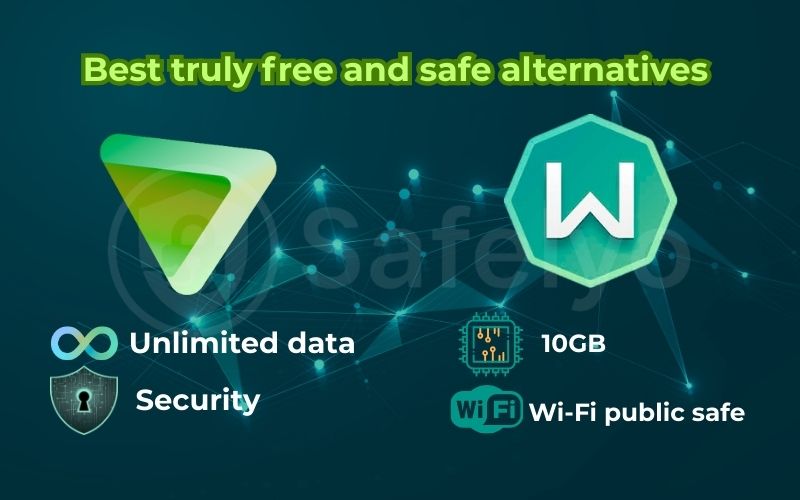
7.2. Best budget-friendly and secure paid alternatives
For the price of a cup of coffee per month, you can get complete protection, unlimited speeds, and access to a full range of features. These are my top picks for affordable, high-quality VPNs.
Surfshark
What I appreciate most about Surfshark is its incredible value. It offers top-tier security, fast speeds, and, most importantly, allows unlimited simultaneous connections. This means you can protect every device in your household with a single, affordable subscription. It’s the perfect “install and forget” solution for comprehensive security.
>> See how it performs in our streaming tests and stacks up against the competition in our in-depth Surfshark review.
CyberGhost
If you’re new to VPNs, CyberGhost is a fantastic choice. I find its app to be one of the most intuitive on the market. It features specialized servers optimized for specific tasks, like unblocking Netflix or secure torrenting, which takes all the guesswork out of it. It’s a powerful VPN wrapped in a beginner-friendly package.
>> Discover if its optimized servers are the right fit for your needs in our complete CyberGhost review.
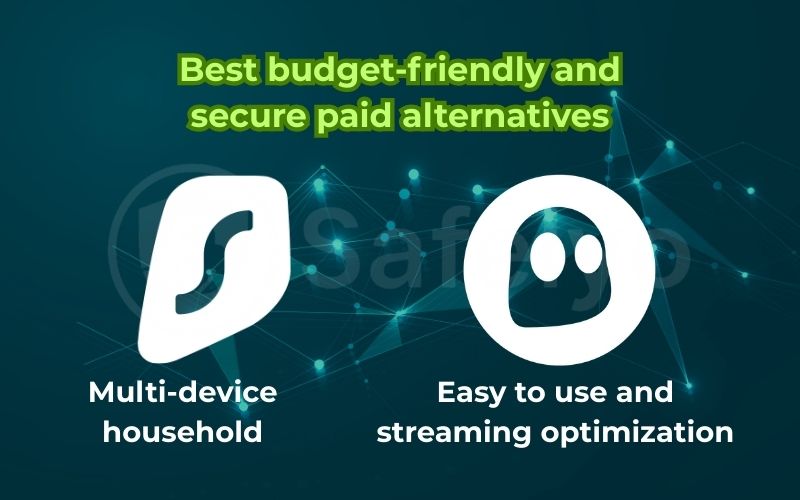
8. FAQ about Hola VPN
Even after all this evidence, you might still have specific questions. Here are direct answers to the most common concerns I hear from users who have considered or used Hola VPN.
Is Hola VPN trustworthy?
No, absolutely not. A trustworthy service does not have a history of turning its users into a botnet-for-hire, does not log extensive personal data, and does not operate on a deceptive peer-to-peer model. Based on its history and technology, Hola is one of the least trustworthy services I have ever analyzed.
Can I get in legal trouble for using Hola VPN?
Yes, you can. This is one of the most serious risks. If another person uses your IP address via Hola to conduct illegal activities (like downloading copyrighted content, making online threats, or committing fraud), you could be the initial subject of a legal investigation. Law enforcement will trace the activity back to your internet connection.
Is Hola VPN Premium safer than the free version?
While the premium version doesn’t turn your device into a peer, it is still not a safe choice. You are still entrusting your data to a company with a documented history of unethical practices and an invasive privacy policy. True security comes from a provider’s ethics and architecture, both of which are fundamentally flawed at Hola.
How long does Hola VPN last for free?
The free version of Hola VPN lasts indefinitely. However, the more accurate question is, “How long am I at risk?” The danger is constant from the moment you install it until the moment you completely remove it from your system.
But Hola helps me unblock Netflix. Is it worth the risk?
No. The risk is not worth the reward. Many safe and reliable VPNs can unblock Netflix and other streaming services without turning your computer into a security liability. The potential for legal trouble and having your data stolen far outweighs the temporary benefit of watching a geo-blocked TV show.
Is Hola better than ExpressVPN?
No. This is not a fair comparison. It’s like asking if a park bench is better than a bank vault for storing your money. ExpressVPN is a premium, highly secure, real VPN with private servers and audited no-logs policies. Hola is a dangerous peer-to-peer network. They are in completely different categories.
What is the Hola VPN review 2026?
The Safelyo Hola VPN review for 2026 is a definitive security warning: Do not use this service. Our analysis confirms it is a dangerous P2P network that logs your data, has a history of abuse, and fails basic security tests by leaking your real IP address.
How do I uninstall Hola VPN completely?
You must be thorough. First, uninstall the application from your computer’s control panel (Windows) or applications folder (Mac). Then, you must also remove the browser extension from Chrome, Firefox, or any other browser you use. As a final precaution, I strongly recommend running a full malware scan with a trusted antivirus program.
9. Conclusion
To conclude this Hola VPN review and security warning, the verdict is inescapable: Hola is not a tool for privacy, but a direct threat to it. Its entire design is fundamentally flawed, insecure, and built on the exploitation of its free users. By using it, you are not protecting yourself; you are gambling with your personal data, your online identity, and your legal safety.
Remember these key points from our investigation:
- It’s a P2P network, not a VPN, using your IP address as a gateway for strangers.
- It has a documented history of being used as a botnet-for-hire.
- It logs your personal data, including the websites you visit.
- Our tests confirmed it fails basic security, leaking your real IP and DNS information.
- It lacks essential VPN features like encryption and a reliable kill switch.
The verdict from Safelyo is unequivocal: uninstall Hola VPN immediately and never look back. Protect yourself properly by choosing a vetted, secure service that is proven to safeguard your privacy. You can find our expert recommendations and detailed analyses in our VPN Reviews category.

